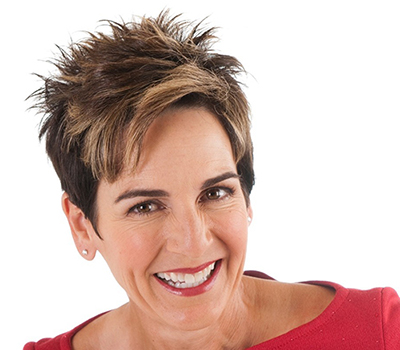Haley Sutton is a promo success story.
After graduating from UNC Charlotte in 2019, she landed a full-time marketing job, got an apartment in the city and started a side hustle selling personalized items on Etsy done on her Cricut machine. She was so successful – with major brands coming her way for kitting and fulfillment in the early days of the pandemic – that, less than a year later, she was able to establish her own distributorship, Box Babe Gift Co. (asi/144160), that did $1.3 million in sales in 2022.
Meanwhile, Maxwell Perry, president & founder of Beantown Blankets (asi/39138) and a fellow member of Generation Z, started his company as a college project. He now oversees custom work for a desirable roster of clients and runs a successful 1:1 giveback program.
And Andrew Titus, all of 26, recently assumed the role of president at Top 40 distributor Fully Promoted (asi/384000), which did $123.7 million in North American revenue in 2022.
This trio may not have decades of industry experience, but what they are doing – like an increasing number of their Gen Z and millennial brethren – is running promo companies both large and small.
Surprised? You shouldn’t be. Though the oldest Gen Zers are 24 years old, they’re the most entrepreneurial generation alive – 62% say they will or are considering starting their own business.
Generational Makeup of the Promo Industry
Meanwhile, millennials, according to Guidant, now own 13% of small businesses in the United States, and are increasingly filling out the executive ranks. In Counselor’s Power 50 for example, Megan Spire of BELLA+CANVAS (asi/39590) and Brittany David, the CRO of Top 40 supplier SnugZ USA (asi/88060), are two of a number of millennials who made the list.
Like the generations that came before them, Gen Z and millennials are committed to the fundamentals – offering a top-tier client experience and staying in step with customer wants and needs as they evolve.
But when it comes to running a business, they differ from the previous generations in key ways – from how they court clients to how they manage personnel and develop more egalitarian corporate cultures. “We value flexibility and transparency,” says Sutton. “We want to empower employees.”
A New Era of Employee Management
Few aspects of the modern work experience have been as thought-provoking – and polarizing – as the question of flexibility and remote work. It was critical during the COVID-19 pandemic. Now that it’s over, is there such a thing as “too much” remote work? With tech advancements and mobility, should employees have the freedom to work from anywhere and how they want, as long as the job is getting done? That debate over the last three years has signified the next major generational shift at the workplace.
Even though they’re just starting their professional careers, remote work isn’t alien for Gen Z – many finished their college degrees online (and often alone) during the pandemic. Caleb Krakow, the son of DRI DUCK (asi/50835) President Jason Krakow, is now the president of Pacz Promotions (asi/289616) – a company he founded with a college friend after graduating from the University of Kansas last year. He lives in Oregon and oversees a sales team in Kansas City, KS, while his business partner Luke manages the finance team in Austin, TX.

“Older generations will say, ‘This is the job, it’s not changing.’ I’m more like, ‘Figure out what you like and we’ll give you an opportunity to do it.’”
Haley Sutton, Box Babe Gift Co.
“We were in college during lockdowns, so we know that sitting at home isn’t just fooling around all day,” says Krakow, who does social media marketing for Richardson Sports (asi/82360) while managing Pacz. “We can be effective working from home. Our sales team is hitting deadlines and creating leads. We’re built on trust.”
Still, despite preconceived norms, a recent Joblist survey found that only 27% of Gen Z would prefer a remote position, compared to almost half of millennials.
However, time spent in a building has to be intentional – neither millennials nor Gen Z want to sit in a cubicle among only immediate team members or worse, in a sparsely populated office. “They want to associate with people beyond their core group they see on Teams or Zoom,” says Katherine Jeffery, PhD, a consultant and speaker on generations in leadership and the workplace. “Some were in the office for a year and then got sent home in 2020. Now they’re looking for ways to advance their career. Companies have to create networking opportunities.”
At BELLA+CANVAS, employees are expected to be in the office five days a week. Spire, a millennial and the company’s vice president of sales, says that places increased importance on individualized management. “I want them to want to show up and spend their time here,” says Spire. “I’m very empathetic and I care about their happiness. If they’re stressed, how can we change things? Can we reprioritize so they feel better? That’s part of my job, to help people be the best they can be. Our people make BELLA the company it is.”
While Titus is in the Fully Promoted corporate office five days a week, and often beyond eight hours, he says he oversees his team of nine with flexibility depending on their individual wants and needs. “I’m a believer in giving employees specific tasks to do each week, and then holding them accountable to that,” he says. “I’m flexible as long as the job is getting done, and I’m totally fine with remote work.”
Sarah Whitaker, owner of Williams Advertising (asi/360402) and a millennial, shares Titus’s sentiment. While she has a brick-and-mortar location in downtown Hopkinsville, KY, as a small distributor she’s able to offer a hybrid environment based on team members’ personal preferences. She’s also seriously considering unlimited PTO and even a four-day workweek.
“We spend a lot of time at work, so it should be a value-add to our lives,” she says. “I want my people to have an overall feeling of enjoyment. That hasn’t always been the conversation in the workplace.”
Instead of strict job parameters, says Sutton, she prefers to let employees define their own roles. “Older generations will say, ‘This is the job, it’s not changing.’ I’m more like, ‘Figure out what you like and we’ll give you an opportunity to do it. If you can find a better way to do it or a way that’s easier for you, let’s make a new standard.’”
These companies may offer slightly different work formats, but there’s a name for how their people are managed. It’s called “facilitator leadership,” says Henry Rose Lee, an author, consultant and keynote speaker on intergenerational diversity and inclusion. It’s managing people in a personalized, individualized way to build a positive, values-based workplace. “It reduces hierarchy and increases community,” says Lee. “The thinking is, ‘We’re all in this together, and you have freedom within a framework we’ve all signed to.’”

“If employers don’t trust their people and employees don’t trust their company, they’re going to be left behind.”
Caleb Krakow, Pacz Promotions
It’s a reaction against the strict chain of command that characterized the workplace for previous generations, who were expected to conform to the existing environment and make no waves. “For younger generations, ‘leadership’ is a role they hold as facilitators with responsibility, but that doesn’t mean they have more value,” says Jeffery. “They look through a lens of equality, while boomers are like, ‘I’m the boss.’ That doesn’t work for millennials and Gen Z.”
In-person or remote, it’s clear that younger generations aren’t beholden to a 9-5 workday. A Microsoft survey last year found that 91% of Gen Z entrepreneurs work unconventional hours, and 81% say they work on vacation. To build their companies to operate that way and offer the same flexibility to their employees requires mutual trust. “If employers don’t trust their people and employees don’t trust their company,” says Krakow, “they’re going to be left behind.”
Digital & Social Natives
While millennials and Gen Z are just as dedicated as previous generations to meet client needs (and evolving however they need to do so), they’re going about it in different ways. Instead of relying on cold-calling, they’re using inbound marketing, building communities on social media and soft-selling to clients – like Sutton, whose Etsy shop was discovered by Salesforce, which helped her distributorship take off.
“A lot of these companies order items on Etsy for their teams so they don’t have to go through corporate,” she says. “So one department uses you and then the word spreads.”
It’s a whole new reality of serving clients – having a presence on digital platforms and social media, where companies provide helpful content and make business connections, and then having the logistics to deliver, particularly as demand for kitting and fulfillment has increased.
Having grown up in a digital environment, Gen Z and millennials are used to intuitive, personalized experiences – and it’s no surprise they’re building their companies to deliver those same experiences. “We have to make it easy for clients to message us and get a quote,” says Alberto Garcia, CEO/founder of Dallas-based Uniformity Print Studio (asi/525953) and a millennial. “Very few want to meet in person. The virtual experience has to be on-point, or they’ll click away within a few seconds.”
Garcia has ambitious plans to invest in more tech and automation – combined with industry talent – to offer a unified client experience. At the moment, he has two sales reps; he’d like to have 10, each with their own dedicated CSR. “We want to grow as a tech company and also hire more talent,” he says. “We want to be in full-on distributor mode.”
Companies small and large continue to smooth out the ordering and delivery process that younger generations are committed to. “We still need to make it easier to work with us,” says Brittany David of SnugZ. “Amazon orders arrive in one to two days. I know we do custom work, but we need to have quicker response times. And the website can’t look like The Oregon Trail. Tech is critical.”
Customers also appreciate friendly engagement on social media rather than spammy sales pitches – it shows authenticity and humanness, says Christy Rossi, the millennial owner of Snatch & Run (asi/329647) in Fort Mill, SC. “We engage with clients’ posts, we share about their business successes and we show we care about what they’re doing, not just taking their money,” she says. “We want to be social and authentic.”
That approach differs from those who approached social media platforms from a transactional perspective. Shafin Tejani, an investor and CEO of Victory Square Technologies, wrote in an article for Worth that Gen Zers already understand branding and self-promotion, and often put their work out before building an audience and finding a way to monetize it. “This ‘new’ social way of doing business just feels natural to them,” he wrote, “much like leasing a storefront or setting up a website was for prior generations.”
Building a network via social media and intuitive marketing campaigns executed over time is different from the way older generations prospected – often by cold-calling. “Boomers picked up the phone and scheduled an in-person meeting – that’s how they built the relationship,” says Jeffery. “Now they expect millennials and Gen Z to pick up the phone intuitively. But younger generations prefer to build relationships through short, consistent contact versus a long conversation. Trust is built in a different way. Millennial and Gen Z clients won’t answer a call from a number they don’t know.”
What the generations do have in common, no matter how they court business, is a shared esteem for promo, and they want to impart that to prospects and clients. “Some just ask for products, but those aren’t the clients we’re looking to work with,” says Garcia. “We have to educate people on what we do, because we want them to respect the industry.”



